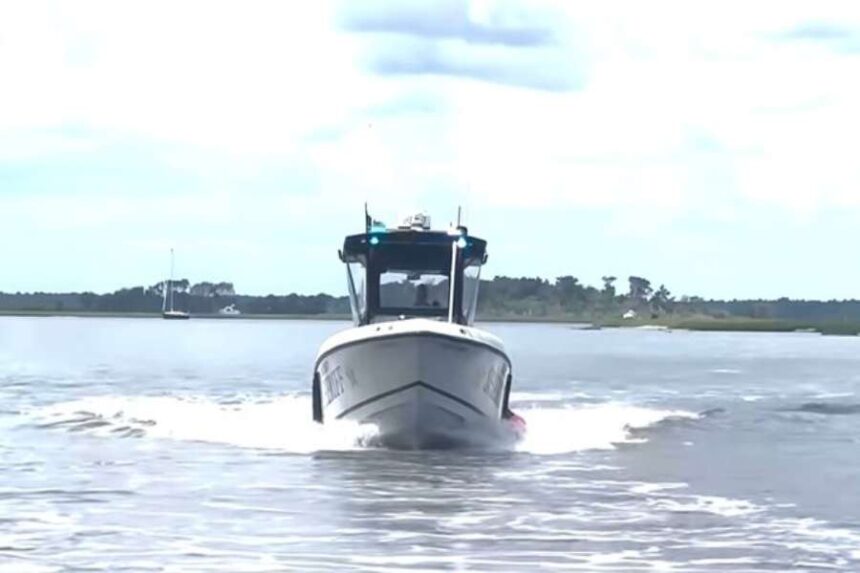In a dramatic incident that underscores the dangers of Florida’s coastal waters, a 14-year-old boy was bitten by a shark during a lifeguard training camp at Ponce Inlet. This incident, which occurred on Monday morning, has highlighted the region’s reputation as a hotspot for shark activity, raising concerns among residents and authorities about beach safety.
The attack took place around 11:15 a.m. when the boy, participating in the Junior Lifeguard Camp, entered the water at Ponce Inlet, a popular beach area north of the jetty.
According to Volusia County Beach Safety (VCBS) officials, the boy was performing a routine water entry exercise when he inadvertently landed on a shark, which bit him on the right calf. Witnesses at the scene described the shark as a 4—to 5-foot Blacktip, a species commonly found in the waters of this region.
Beach safety officials were quick to respond to the scene. The boy’s injuries, while serious, were not deemed life-threatening. First responders provided immediate medical attention on the beach, treating the lacerations on his leg before transporting him to a local hospital for further care. The boy was accompanied by his parents, who took him to get stitches.
Florida, particularly Volusia County, is well-known for its frequent shark encounters. The Florida Museum of Natural History’s International Shark Attack File reports that Volusia County has the highest recorded shark attacks globally, with 351 incidents since 1882.
This reputation has earned the country the dubious “shark capital of the world.” In 2023 alone, Florida recorded 16 shark bites, making it the state with the most shark attacks in the U.S., followed by Hawaii, which had eight unprovoked bites.
The attack on the young lifeguard trainee is part of a concerning trend of shark bites in the area. In the days leading up to this incident, two other shark attacks were reported in nearby New Smyrna Beach.
On the previous Friday, a 26-year-old man was bitten on the foot while floating on an innertube, and just a day earlier, a 21-year-old man was bitten while playing football in shallow water. These incidents have heightened the awareness and anxiety among beachgoers and have prompted local authorities to issue warnings and reminders about shark safety.
Historical data suggests that shark attacks in Florida are more common during certain times of the year. According to the International Shark Attack File, July, August, September, and October have seen the highest frequency of attacks since 1926. Despite this seasonal pattern, there has been a noticeable increase in shark activity earlier in the year. For instance, in early June, several beaches in Walton County were temporarily closed following two back-to-back shark attacks.
In light of the recent attacks, Volusia County Beach Safety officials have reiterated the importance of following safety guidelines to minimize the risk of shark encounters. Some key recommendations include:
Sharks are most active in the early morning and late afternoon, so it is advisable to avoid swimming during these times.
Sharks often hunt near schools of fish. Beachgoers should avoid areas where fish are actively feeding or birds are diving into the water.
The reflection of light on shiny objects can attract sharks. Swimmers and surfers should avoid wearing jewelry in the water.
It is crucial to pay attention to local news and beach warnings. If shark sightings are reported or if there have been recent attacks, it is best to stay out of the water.
Sharks are more likely to attack individuals alone, but swimming in groups can reduce the risk of an encounter.
The recent spate of shark attacks has increased vigilance among local communities and authorities. Lifeguards and beach safety personnel are undergoing additional training to respond swiftly to shark encounters. Public awareness campaigns are also being intensified to educate beachgoers about the risks and safety measures associated with shark-infested waters.
As Florida continues to be a popular destination for tourists and locals alike, the recent shark attacks serve as a sobering reminder of the inherent risks present in these waters.
The incident at Ponce Inlet, along with the other recent attacks in New Smyrna Beach, highlights the need for continuous education, preventive measures, and prompt emergency responses to ensure the safety of all beach visitors.
By staying informed and following recommended safety guidelines, beachgoers can enjoy Florida’s beautiful coastal waters while minimizing the risk of shark encounters.




